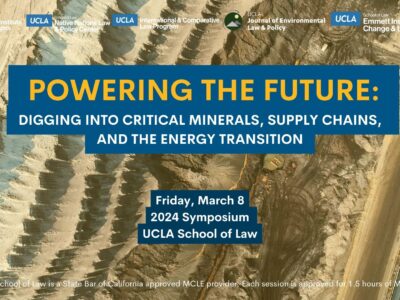The multiple values of nature

Two interesting storylines came together last week about what nature does for people. The first has to do with economic value, the second with non-economic value.
On the economic side, The Economics of Ecosystems and Biodiversity, a project of the United Nations Environment Programme, the European Union, and several European nations, released a report for policymakers arguing that when the value of ecosystem services is accurately accounted for, the economic benefits of conservation frequently exceed those of extractive uses. (If you want the short version, BBC News has a story here.) The TEEB report is heavy on convincing policymakers to consider the value of ecosystem services but light on the specifics of how to do that. A new report by the World Resources Institute, Banking on Nature’s Assets, provides more specific recommendations directed to multilateral development banks for tools to incorporate ecosystem services into their decisions.
I’ve long been skeptical that economic benefits alone can justify as much nature protection as I’d like to see, but that doesn’t mean we shouldn’t pay attention when an economic cost-benefit analysis favors nature protection. Clearly, individuals and nations should at least know what they’re giving up when they choose development over conservation.
One especially welcome aspect of the TEEB report is its attention to distributional concerns. Conservation can be welfare-enhancing on a global basis, but still economically harmful to local people or landowners. Simply recognizing the value of ecosystem services won’t ensure their protection; enough of the value of protection must accrue to those actually making the choice between conservation and development to justify the shift. In some cases, that may mean arranging payments to local communities. In others, the larger society may decide that it’s appropriate simply to order local actors not to harm larger interests. If that judgment represents a sudden policy shift, it may be appropriate to provide transition assistance to affected interests.
Careful economic analysis may be necessary, but it is not sufficient as a basis for decisions about what to conserve. Nature provides many non-market values. Tools developed by economists, like contingent valuation, can help account for some non-market values, such as esthetic preferences. It’s less clear that those tools can produce robust estimates of things like option and existence value. And there are benefits from nature that conceptually simply don’t fit into an economic analytical framework.
One of those is the effect that nature has on the character and values of people who experience it. Legal and other policy choices have a lot to do with the development of both values and capabilities. Policies about whether to preserve nature, in what form, and where, for example, have a lot to do with the opportunities people have to experience nature. People who grow up with less exposure to nature are less likely to feel comfortable in the natural world, and to value it. Both what conservation policy reflects about our character and how it might shape our character have been part of the rhetoric of conservation debates in the United States from the earliest days. Embarrassment over what the commercialization of Niagra Falls seemed to say about the American character became a prime motivator of the national park movement, and the park system was sold to the larger political community in part by the promise that people who experienced parks would become not only physically vigorous but also patriotic and productive.
Those effects on people’s skills and values can’t coherently be factored into an economic cost-benefit analysis. Cost-benefit analysis starts from the assumption that people’s preferences are their own, and that the relevent analytic task is simply to recognize and aggregrate those values, not to assign values to the range of possible values. In my view, nation’s both should and do want to instill core values in their citizens, but which values they choose has to be a matter of political and cultural decisionmaking, not one based on some estimate of relative economic value.
A recent post by Nancy Stoner, at NRDC’s Switchboard blog, points to an effect of nature that was new to me, and ought to be part of the conservation policy decision. Exposure to nature apparently can make people more likely to care about others, and less interested in acquiring fame and wealth for themselves. Researchers at the University of Rochester (paper here, I think freely available), had people look at slides that were matched for color, complexity and other factors, but showed either a nature scene or a human-made scene. They avoided slides of animals or identifiable buildings. Then they asked their subjects to respond to questionnaires intended to measure their self-focused and community-focused aspirations. Controlling for the effect of the slides on mood, the researchers found that people who saw nature slides gave more community-regarding answers on the questionnaire.
This is just one study, of course, and its limitations are apparent, but it’s suggestive in an interesting way. I’ve always thought that environmentalists are systematically more community-oriented, and less individualistic, than most Americans. That could just mean that community-minded people are drawn to the environment and environmental causes. But this study suggests that it could also mean that exposure to nature, which environmentalists are likely to get more of than others, enhances community-regarding character. Since I happen to think that’s a character attribute society should want to encourage, I’ll happily take this study as one more reason for protecting nature, and specifically for protecting it in ways that encourage people to experience it.
And in response to Sean’s earlier post, which I agree with, that highly generalized conclusions about nature being good for people in one way or another aren’t useful policy guides, I would add that if we know what we want from nature we can ask what that should mean for policy. If one thing we want is to encourage people to be more community-focused, we can study the extent to which different types of nature experience promote that effect. My hope and expectation would be that an actual experience outdoors in a place with more apparently “natural” than “artificial” qualities would be more effective than looking at a photograph.








Reader Comments